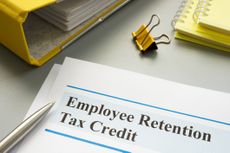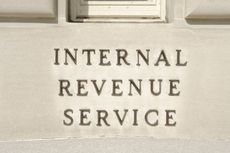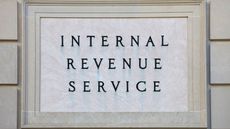Will an IRS Tax Prep Service Replace H&R Block or TurboTax?
A government-run tax preparation and filing service has some wondering if people will leave H&R Block and TurboTax and let the IRS do their taxes instead.


For the 2024 tax filing season, the IRS is piloting a tax prep and filing service where taxpayers can bypass accountants and popular software and file their federal tax returns directly with the agency — for free. The IRS Direct File limited program pilot is available to selected taxpayers in 12 states. Nationwide, several hundred taxpayers are expected to participate.
“The IRS is committed to delivering significantly improved services by providing taxpayers with tools, information, and assistance to make it easier to comply with their tax filing obligations,” Commissioner Danny Werfel said in a statement about Direct File.
Meanwhile, tax preparation companies H&R Block and Intuit's TurboTax oppose the IRS getting into the tax preparation business and have lobbied against the idea for years. Recently, both companies have faced criticism and formal complaints from the Federal Trade Commission (FTC) for alleged deceptive advertising practices regarding their tax-free filing services and products. H&R Block was also accused by the FTC in February of improperly deleting customer data.

Sign up for Kiplinger’s Free E-Newsletters
Profit and prosper with the best of expert advice on investing, taxes, retirement, personal finance and more - straight to your e-mail.
Profit and prosper with the best of expert advice - straight to your e-mail.
IRS Direct File pilot
- The IRS is currently piloting (with limited capacity) Direct File for the current 2024 tax filing season.
- Twelve states, mostly those without income tax (Arizona, California, Florida, New Hampshire, New York, Nevada, Massachusetts, South Dakota, Tennessee, Texas, Washington, and Wyoming) are part of the initial limited 2024 pilot.
- The agency says 70% of taxpayers surveyed expressed interest in a free IRS-provided tool to prepare and file taxes.
- IRS data reveal that people spend an average of about $250 to prepare their taxes.
The Biden administration allocated $15 million to the IRS in the Inflation Reduction Act to evaluate the feasibility of offering a free electronic tax preparation and filing service. The total allocation of funds to the IRS from the IRA is $80 billion over ten years, but a debt ceiling agreement reached by Congressional lawmakers last year clawed some of those funds back.
Not the same as Free File
It’s important to note that this is not IRS Free File. The proposed Direct File service would be different from IRS Free File. (That system is designed for people with income under $79,000 for the 2023 tax year. However, Free File is rarely used by eligible taxpayers, according to government data.)
On the other hand, this IRS-run tax prep and filing service will ultimately be available to a wider range of taxpayers with uncomplicated returns and incomes up to around $200,000. The agency says it is designed to be as easy or easier to use than traditional tax prep software. But like IRS Free File, the IRS Direct File tax prep service is also electronic and free.
In addition to considering the feasibility of a Direct File system, a key IRS report focuses on taxpayer opinions and costs and contains independent analysis. According to the report, potential benefits and challenges associated with the implementation by the IRS of a Direct File program include:
- Improved experience and cost savings for some taxpayers who currently spend money to file their taxes either with accountants or using tax preparation software.
- Operational challenges like having in-house technical expertise and sufficient customer service to support Direct File.
- The IRS would also have to figure out how to coordinate with states — many taxpayers are used to filing their state and federal taxes at the same time. To that end, the IRS announced that some states participating in the 2024 pilot of the program will offer state tax filing.
Of course, there’s also a question of trust. The agency acknowledges that taxpayers may question IRS motives in offering a Direct File tool. People also worry about the tool impacting IRS audits and future tax enforcement.
The IRS indicates that younger people who prepare their own tax returns might be interested in Direct File. Additionally, according to the report, taxpayers who were shown a “functioning internal prototype of Direct File, developed for research purposes, reported that the software exceeded their expectations in terms of ease of use and simplicity.”
IRS Direct file a threat to TurboTax and H&R Block?
Intuit, maker of TurboTax, has previously indicated that a potential IRS tax prep service could pose a business threat. In SEC filings, the company reportedly wrote, “We anticipate that governmental encroachment at both the federal and state levels may present a continued competitive threat to our business for the foreseeable future.”
Intuit also recently settled a lawsuit over allegations that the company “tricked” taxpayers into paying for its tax software when they thought they were receiving a free version. However, as Kiplinger previously reported, in agreeing to the $144 million TurboTax settlement, Intuit did not admit wrongdoing. Earlier this year, the FTC found Intuit TurboTax engaged in deceptive advertising of its tax-free offerings. Intuit is appealing the finding. Meanwhile, H&R Block, also the subject of FTC investigation for improper handling of customer data and deceptive advertising, has previously supported proposed legislation that would have effectively banned the IRS from offering certain tax filing services.
Just before the IRS Direct File report was released last summer, Intuit stock (INTU) fell to its lowest point that month, and H&R Block stock (HRB) was down 4.8%. However, since the Direct File program is in the pilot stage, it’s hard to say whether a government-run tax prep service can compete with or harm similar services provided by those and other traditional companies.
And the cost to run Direct File will be an issue. Preliminary estimates indicate that an IRS tax prep service could cost between $64 million and $249 million a year, depending on how many taxpayers use it.
Related Content
- FTC: Intuit TurboTax-Free Filing Ads Are Deceptive
- A Dozen States Sign On to IRS Direct File Pilot
- How the IRS Will Use AI This Tax Season

As the senior tax editor at Kiplinger.com, Kelley R. Taylor simplifies federal and state tax information, news, and developments to help empower readers. Kelley has over two decades of experience advising on and covering education, law, finance, and tax as a corporate attorney and business journalist.
-
 Types of Income the IRS Doesn't Tax
Types of Income the IRS Doesn't TaxIncome Tax It may feel like the IRS taxes most of your hard-earned money, but some types of income are nontaxable.
By Kelley R. Taylor Last updated
-
 How to Write a Wedding Check as a Gift
How to Write a Wedding Check as a GiftThere are some guidelines to writing a check for a wedding gift for newlyweds.
By Alexandra Svokos Published
-
 Is the IRS Waiving Your Back Tax Penalties?
Is the IRS Waiving Your Back Tax Penalties?Tax Relief The IRS is waiving penalties for nearly $1 billion in back taxes owed during the pandemic. Are you eligible?
By Kelley R. Taylor Last updated
-
 Time to Act on These End-of-Year Tax Planning Tips: Tax Letter
Time to Act on These End-of-Year Tax Planning Tips: Tax LetterTax Letter With a short time left before 2023 comes to a close, tax planning is all-important. Here are some areas to focus on.
By Joy Taylor Last updated
-
 You May Have to Put Catch-Up Contributions in a Roth 401(k): That's Not a Bad Idea
You May Have to Put Catch-Up Contributions in a Roth 401(k): That's Not a Bad IdeaRoth 401(k) High earners will be required to put their catch-up contributions in a Roth 401(k).
By Sandra Block Published
-
 Can You Withdraw or Repay Your ERC Claim?
Can You Withdraw or Repay Your ERC Claim?Tax Credits The IRS says certain businesses can withdraw or repay potentially fraudulent employee retention tax credit claims.
By Katelyn Washington Last updated
-
 Free IRS Direct File Pilot Program: Who's Eligible?
Free IRS Direct File Pilot Program: Who's Eligible?Tax Filing The IRS is piloting a free direct file program, but not all taxpayers can use it right away.
By Katelyn Washington Last updated
-
 Five Tax Breaks for Paying Your Student Loan
Five Tax Breaks for Paying Your Student LoanTax Letter After a three-year pause, student loan payments have resumed, putting a dent in people's wallets. But there are some tax breaks that can help.
By Joy Taylor Published
-
 From Chatbots to Audits: How the IRS Will Use AI This Tax Season
From Chatbots to Audits: How the IRS Will Use AI This Tax SeasonIRS The IRS has plans to increase its use of AI. Here’s how the agency will do it and what it could mean for taxpayers.
By Katelyn Washington Published
-
 Tax Relief Following State of Israel Terrorist Attacks
Tax Relief Following State of Israel Terrorist AttacksIRS Relief Taxpayers impacted by terrorist attacks on the State of Israel have extended tax filing and payment deadlines.
By Katelyn Washington Published









